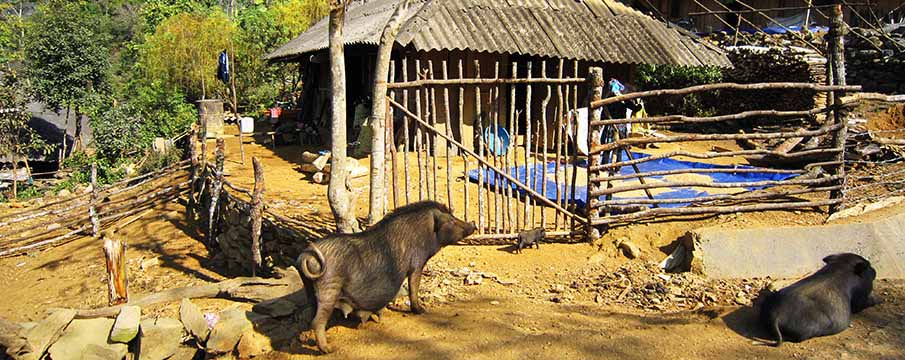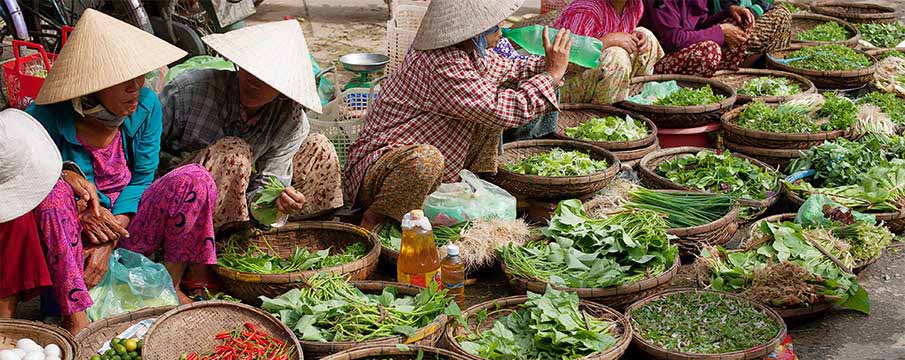
Quick answer: Before travelling to Vietnam, make sure your routine vaccinations are updated and consider a few travel-specific ones depending on your itinerary. Vaccines like hepatitis A, typhoid, and Japanese encephalitis are the most commonly recommended for visitors, while malaria prevention is only needed in certain rural areas.
At a glance:
- 💉 Routine vaccines: DTP, MMR, polio, influenza.
- 🧴 Hepatitis A: Recommended for most travellers.
- 🩺 Hepatitis B: For longer stays or close contact with locals.
- 🍲 Typhoid: Useful if eating street food or visiting rural areas.
- 🦟 Japanese encephalitis: For rural stays or trips during rainy season.
- 🐕 Rabies: Consider if you’ll be around animals or remote zones.
- 🌍 Malaria: Only a risk in specific rural regions.
Last updated in November 2025
Think about vaccinations for Vietnam. There may be some health risks.
There are certain health risks in Vietnam, similar to the other Asian countries. Examples include jaundice, typhoid, malaria and rabies. However, if you follow basic rules for good health, vaccinations for Vietnam do not seem too important. In recent years typhoid or malaria have not been recorded as a high risk in Vietnam. Particular vaccinations for traveling to Vietnam are not officially required by the authorities – it is not mandatory.
Vietnamese cuisine and eating habits are different – buy probiotics.
What Vaccinations do I need for traveling to Vietnam? If you are going intoremote mountain areas and minority villages, think about a vaccination against jaundice (Hep A/B) and rabies. Check also that you have vaccinations for tetanus and typhoid. The guesthouses or hotels of standard quality are almost always clean. You will meet a lot of wandering dogs and other animals – be calm, they are not as dangerous as they sometimes seem.
Vietnam has modern health services but only in the large cities.
Vietnam has changed and modernized in recent years. It is not a problem finding modern hospitals, clinics and foreign doctors in big cities like Hanoi or Ho Chi Minh City. But the situation is different in the smaller towns and villages in northern Vietnam, where there are limited health services.

Vaccination for Vietnam is not mandatory – but think about it.
Before embarking on your trip to Vietnam, it is important to ensure that you have the necessary vaccinations to protect yourself from potential health risks. Vietnam, a beautiful country known for its rich culture and stunning landscapes, may have specific health concerns that travelers should be aware of. In this article, we will discuss the essential vaccinations recommended for tourists traveling to Vietnam, excluding those related to COVID-19.
Before taking any vaccine for Vietnam, consult a doctor!
It is highly recommended to consult with a healthcare professional or a travel medicine specialist well in advance of your trip to Vietnam. They can provide personalized advice based on your health history, itinerary, and specific travel plans. They may also discuss other potential health risks and provide necessary vaccinations or preventive measures accordingly.
The 3 biggest health threats in Vietnam:
1. Malaria
Malaria is a significant health concern in many tropical and subtropical regions, including parts of Vietnam. As a tourist planning to visit this beautiful country, it is essential to be aware of the risks associated with malaria and take appropriate preventive measures. In this article, we will provide information about malaria in Vietnam, its transmission, prevention strategies, and precautions to help ensure a safe and healthy trip.
Malaria Risks in Vietnam:
High-Risk Areas: Malaria transmission occurs in specific regions of Vietnam, mainly in rural and forested areas, particularly along the borders with Cambodia, Laos, and Myanmar. Some high-risk provinces include Dak Nong, Gia Lai, and Kon Tum.
Seasonal Variation: Malaria transmission in Vietnam has seasonal variations, with higher risk during the rainy season (May to October). The risk decreases during the dry season (November to April).
2. Traveler’s diarrhea
Traveler’s diarrhea is a common concern for tourists visiting Vietnam, as it can significantly impact travel experiences. Understanding the causes, prevention strategies, and management techniques for traveler’s diarrhea can help ensure a healthier and more enjoyable trip. In this article, we will provide information about traveler’s diarrhea in Vietnam and offer practical tips to minimize the risk and effectively manage the condition.
Causes of Traveler’s Diarrhea:
Traveler’s diarrhea is typically caused by consuming contaminated food or water. In Vietnam, the following factors contribute to the risk of developing traveler’s diarrhea:
Contaminated Food and Water: Consuming raw or undercooked foods, unpasteurized dairy products, or drinking tap water or untreated water from unreliable sources can increase the risk of infection.
Poor Hygiene Practices: Inadequate hand hygiene, improper food handling, and unclean utensils can contribute to the spread of pathogens.
3. Rabies
Rabies is a viral disease that poses a serious health risk in Vietnam. As a tourist visiting this beautiful country, it is crucial to be aware of the potential threat of rabies and take appropriate measures to protect yourself. This article aims to provide information about rabies in Vietnam, including its transmission, prevention strategies, and recommended actions in case of exposure.
Rabies Transmission and Risk Factors:
Rabies is primarily transmitted through the bite or scratch of an infected animal, such as dogs, cats, bats, or other wildlife. In Vietnam, the following factors contribute to the risk of rabies:
Stray Animals: Stray dogs, particularly in urban areas, can carry the rabies virus.
Rural Areas: Rural regions in Vietnam may have a higher prevalence of rabies due to the presence of wildlife reservoirs.
Limited Animal Vaccination Programs: Some areas may have limited access to animal vaccination programs, increasing the risk of rabies transmission.

Healthcare in Vietnam:
Healthcare and sanitary conditions in hospitals in Vietnam vary depending on the location and facility. Vietnam has made significant progress in improving its healthcare system over the years, but challenges still exist, particularly in rural and remote areas. Here are some key points regarding healthcare and sanitary conditions in Vietnamese hospitals:
Infrastructure and Facilities: Major cities, such as Hanoi and Ho Chi Minh City, have modern hospitals equipped with advanced medical technology and facilities. Rural areas and smaller towns may have more basic healthcare facilities with limited resources and equipment.
Healthcare Personnel: Vietnam has a growing number of well-trained healthcare professionals, including doctors, nurses, and specialists.Major cities attract highly skilled healthcare workers, while rural areas may face shortages of medical staff.
Hygiene and Sanitary Practices: Hospitals in Vietnam generally adhere to basic hygiene practices, such as hand hygiene, infection control, and waste management. However, there may be variations in compliance with these practices across different healthcare facilities.
What to watch out for in Vietnam:
When it comes to hygiene in Vietnam, there are several factors to be mindful of to maintain good health and minimize the risk of illnesses. Here are some key areas to watch out for:
Street Food: While street food is an integral part of the culinary experience in Vietnam, be cautious about the cleanliness and hygiene of street food stalls. Choose vendors that handle food hygienically, prepare food in front of you, and have a steady stream of customers.
Tap Water: It is generally recommended to avoid drinking tap water in Vietnam. Stick to bottled water or purified water from reliable sources.
Ice and Beverages: Be cautious about ice cubes and beverages that may be prepared with tap water. Confirm that ice and beverages are from safe and clean sources.
Wash Hands Regularly: Practice proper hand hygiene by washing your hands thoroughly with soap and clean water, especially before eating, after using the restroom, and after touching surfaces in public areas.
Public Restrooms: Public restrooms in Vietnam may vary in terms of cleanliness and hygiene. Carry tissues or wet wipes and hand sanitizer for situations where restroom conditions are subpar.
Accommodation: Check reviews and choose accommodations that prioritize cleanliness and hygiene. Ensure that your room and bathroom are properly cleaned and maintained.
Mosquitoes: Protect yourself from mosquito bites by using insect repellents containing DEET, wearing long sleeves and pants, and staying in accommodations with proper mosquito control measures.
Dengue Fever: Vietnam is endemic to dengue fever. Take precautions to prevent mosquito bites, particularly during peak mosquito activity periods, such as dawn and dusk.
Other Insect-borne Diseases: Be aware of other insect-borne diseases like malaria and Japanese encephalitis, especially if you are visiting rural or remote areas. Consult with a healthcare professional for appropriate preventive measures, such as vaccinations and antimalarial medications.
What to do before departure to Vietnam:
Before departing to Vietnam, taking certain steps related to hygiene, vaccination, and health check-ups can help ensure a safer and healthier trip. Here are some recommendations:
Consult with a Healthcare Professional: Schedule a pre-travel consultation with a healthcare professional or travel medicine specialist well in advance of your trip to Vietnam. They can provide personalized advice based on your medical history, destination, and planned activities. Discuss any pre-existing health conditions and ensure that you are fit for travel.
Vaccinations: Stay up to date with routine vaccinations, such as measles, mumps, rubella, diphtheria, tetanus, and pertussis. Verify that you have received vaccinations against diseases commonly found in Vietnam, including hepatitis A, hepatitis B, typhoid, and Japanese encephalitis. Your healthcare professional will recommend the necessary vaccinations based on your specific itinerary and risk factors. Consider receiving a seasonal influenza vaccine before departure.
Medications and Prescriptions: Ensure you have an adequate supply of any prescribed medications for the duration of your trip. Keep them in their original packaging with clearly labeled instructions. If you require specific medications, such as antimalarials, consult with your healthcare professional for appropriate prescriptions and instructions.
Travel Insurance: Purchase comprehensive travel insurance that covers medical expenses, emergency evacuation, and repatriation. Familiarize yourself with the coverage details, including exclusions and claim procedures.
Hygiene and Personal Care Items: Pack essential personal hygiene items, such as hand sanitizer, wet wipes, tissues, and any preferred brands of toiletries. It’s advisable to carry them in your hand luggage for easy access during travel. Consider packing mosquito repellents containing DEET, sunscreen, and insect bite relief creams.
Traveler’s Health Kit: Assemble a traveler’s health kit containing basic medical supplies, including adhesive bandages, antiseptic wipes, pain relievers, antidiarrheal medication, and any specific medications recommended by your healthcare professional.

Hospitals, Clinics and Phone Numbers + Contacts in Vietnam:
(For current phone numbers of hospitals I recommend to visit the website of the hospital, the numbers may change).
First-aid hotline: 115
Hanoi (Northern Vietnam):
| Hospitals in Hanoi: | Address |
|---|---|
| International SOS | 51 Xuan Dieu (behind Fraser Suites) Vietnam, Quảng An, Tây Hồ |
| French hospital | No1 Phương Mai, Đống Đa, Hanoi, Vietnam |
| Hanoi Family Medical Practice | 298 / Kim Ma Street, Van Phuc Compound |
| Saint Paul Municipal Hospital | 12 Chu Van An, Hanoi |
| Serenity International Dental Clinic Hanoi | 19 Nguyễn Trường Tộ, Nguyễn Trung Trực, Ba Dinh District, Hanoi |
Lao Cai (Northern Vietnam):
| Hospital in Lao Cai: | Address |
|---|---|
| Hospital Lao Cai Province | B8 Đường Chiềng On, Bình Minh, Lào Cai |
Ho Chi Minh City (Southern Vietnam):
| Hospitals in Ho Chi Minh City: | Address |
|---|---|
| Victoria International Healthcare Clinic | 79 Dien Bien Phu, Da Kao, District 1, Ho Chi Minh City |
| Franco Vietnam Hospital | 6 Nguyen Luang Bang St, District 7, Ho Chi Minh City |
| Medical Diagnostic Centre | 254 Hoa Hao, District 10, Ho Chi Minh City |
| Westcoast International Dental Clinic | 27 Nguyen Trung Truc, District 1, Ho Chi Minh City |
Da Nang (Central Vietnam):
| Hospitals in Da Nang: | Address |
|---|---|
| Family Hospital | 71 Nguyễn Hữu Thọ, Hòa Thuận Tây, Hải Châu, Đà Nẵng |
| Hoan My Da Nang Hospital | 161 Nguyễn Văn Linh, Thạc Gián, Đà Nẵng |
| Da Nang General Hospital | 124 Hải Phòng, Thạch Thang, Đà Nẵng |
| Da Nang C Hospital | 122 Hải Phòng, Thạch Thang, Đà Nẵng, Vietnam |
❓ Frequently Asked Questions – Vaccination to Vietnam:
1. Do I need vaccinations before traveling to Vietnam?
-
- Yes, certain vaccinations are recommended before traveling to Vietnam to protect against common diseases. It is important to consult with a healthcare professional or a travel health clinic for personalized advice based on your medical history and travel plans.
2. What are the recommended vaccinations for travelers to Vietnam?
-
- The recommended vaccinations for travelers to Vietnam may include Hepatitis A, Hepatitis B, Typhoid, Tetanus, Diphtheria, Pertussis (Tdap), Measles, Mumps, Rubella (MMR), and Influenza. Depending on your travel duration, activities, and specific health conditions, additional vaccines like Japanese Encephalitis or Rabies may be recommended.
3. When should I get vaccinated before traveling to Vietnam?
-
- It is recommended to get vaccinated at least 4-6 weeks before your travel to allow enough time for the vaccines to take effect and for any necessary additional doses. However, even if you have less time, it is still beneficial to get vaccinated as it provides some level of protection.
4. Are there any specific health risks in Vietnam that I should be aware of?
-
- While there are no major health risks specific to Vietnam, it is always advisable to take precautions to prevent common illnesses such as traveler’s diarrhea, mosquito-borne diseases like dengue fever or malaria (in certain regions), and waterborne diseases. Proper food and water hygiene, insect bite prevention measures, and adhering to personal hygiene practices are important.
5. Are there any mandatory vaccinations for travelers to Vietnam?
-
- Currently, there are no mandatory vaccinations required for entry into Vietnam. However, it is recommended to have up-to-date routine vaccinations and follow the advice of healthcare professionals.
6. How can I find a travel clinic or healthcare provider for vaccinations?
-
- You can consult with your primary healthcare provider for vaccinations or visit a travel health clinic. These clinics specialize in providing vaccinations, travel advice, and information on health risks specific to your destination. Many countries have online directories or resources to help you find a nearby travel clinic.
7. Are there any other health precautions I should take besides vaccinations?
-
- Besides vaccinations, it is important to take other health precautions when traveling to Vietnam. These include practicing good hand hygiene, using insect repellent, wearing appropriate clothing to protect against mosquito bites, consuming safe and clean food and water, and avoiding contact with animals or animal waste.
8. Should I bring a copy of my vaccination records while traveling in Vietnam?
-
- It is recommended to carry a copy of your vaccination records when traveling to Vietnam. In case of any medical emergencies or if required by immigration authorities, having proof of your vaccinations can be helpful.
9. Do I need travel insurance that covers medical expenses in Vietnam?
-
- While it is not mandatory, having travel insurance that includes medical coverage is highly recommended. It can provide financial protection in case of unexpected medical emergencies, hospitalizations, or evacuation needs.
10. Can I receive vaccinations upon arrival in Vietnam?
-
- Generally, it is recommended to receive vaccinations before your travel to Vietnam. However, some travel clinics or healthcare providers may offer vaccinations upon arrival. It is advisable to check with the Vietnamese embassy or consulate and consult with a healthcare professional for specific requirements and availability.
| Vaccine | Recommended for |
|---|---|
| Hepatitis A | All travelers |
| Typhoid | All travelers |
| Hepatitis B | All travelers (consider for longer stays or frequent travel) |
| Japanese Encephalitis | Rural areas, outdoor activities, or extended stays |
| Rabies | Adventure travelers, those at risk of animal bites |
| Influenza | All travelers (seasonal) |
| Tetanus, Diphtheria, Pertussis | Routine vaccination, if not up to date |
| Measles, Mumps, Rubella | Routine vaccination, if not up to date |
| Malaria (Antimalarial) | Some regions may require prophylaxis (consult a doctor) |
BOOK TICKETS for Transport in Vietnam ➜

